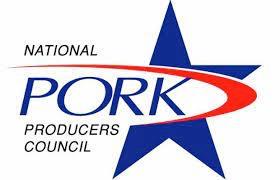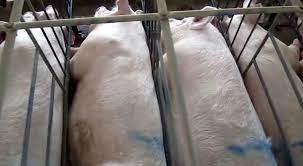 In advance of the oral hearing by the Supreme Court of the United States on the constitutionality of Proposition#12, the National Pork Producers Council has submitted a financial projection purporting to represent the cost of the regulation to pork producers. The Council has estimated a cost of $3,500 per sow to transition from gestation crates to group housing. The Council maintained that Proposition#12 will add millions of dollars in costs to producers who will be required to construct enclosures that allow for 24 square feet per sow.
In advance of the oral hearing by the Supreme Court of the United States on the constitutionality of Proposition#12, the National Pork Producers Council has submitted a financial projection purporting to represent the cost of the regulation to pork producers. The Council has estimated a cost of $3,500 per sow to transition from gestation crates to group housing. The Council maintained that Proposition#12 will add millions of dollars in costs to producers who will be required to construct enclosures that allow for 24 square feet per sow.
In July, EGG-NEWS reported on the amici brief, submitted by Dr. Richard Sexton and Dr. Daniel Sumner in which they pointed to the inherent flaw in the pork producers’ claim of an immense investment required to comply with Proposition#12. As distinguished agricultural economists at the University of California, Davis, Drs. Sexton and Sumner calculated that the cost of conversion would amount to $5 per weanling pig produced for the market in California. This represented a retail value of three cents per pound to consumers of pork in the state, equivalent to 7.7 percent of their pork purchases at retail and amounting collectively to $320 million annually.
 The amici brief noted that the analysis submitted by the National Pork Producers Council and the American Farm Bureau Federation "rests on the unsupported and plainly incorrect assumption that all pork producers nationwide will be forced to comply with Proposition#12 and that the cost of complying will be passed on to all pork consumers nationwide. The level of conversion to group housing to date more than satisfies the requirement for California. Sumner and Sexton also emphasized that there is no imperative on any hog producer to comply with Proposition#12.
The amici brief noted that the analysis submitted by the National Pork Producers Council and the American Farm Bureau Federation "rests on the unsupported and plainly incorrect assumption that all pork producers nationwide will be forced to comply with Proposition#12 and that the cost of complying will be passed on to all pork consumers nationwide. The level of conversion to group housing to date more than satisfies the requirement for California. Sumner and Sexton also emphasized that there is no imperative on any hog producer to comply with Proposition#12.
The question before SCOTUS relates to the constitutionality of Proposition#12 in relation to interstate commerce. The Justices will be disinclined to consider economic factors, welfare issues or other peripheral considerations other than the dormant commerce clause.
Irrespective of the outcome of the case, pork producers will have to transition from gestation crates for sows based on the intermediate term commitments of customers in the food service, restaurant and retail sectors all of whom will require group housing for sows in their sourcing of pork. The train has left the station for this segment of the intensive livestock industry.